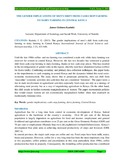| dc.contributor.author | Kariuki, James G | |
| dc.date.accessioned | 2015-09-25T08:07:20Z | |
| dc.date.available | 2015-09-25T08:07:20Z | |
| dc.date.issued | 2013 | |
| dc.identifier.citation | kariuki james gichuru. "The gender implications of men’s shift from cash-crop farming to dairy farming in Central Kenya." International Journal of Social Sciences and Entrepreneurship. 2013;1(5):631-646. | en_US |
| dc.identifier.uri | http://ijsse.org/articles/ijsse_v1_i5_631_646.pdf | |
| dc.identifier.uri | http://hdl.handle.net/11295/91481 | |
| dc.description.abstract | Until the late 1980s coffee
-
and
tea farming was considered a male role while dairy farming was
reserved for women in central Kenya. However, the last two decades has witnessed a gradual
shift from cash
-
crop farming to dairy
-
farming, thanks to low cash
-
crop prices. This has resulted
in the reconfiguration of gender roles in the region, where by
men have abandoned
kahua(coffee)
for
Karia(milk). Combining secondary and primary data collection techniques, this paper
looks
at the
impediments to
cash cropping
in central Kenya and the dynamics behind this rural socio
-
economic reconstruction. The study shows
that to perpetuate patriarchy,
men can shift from
‘
masculine’ economic activities into activities that are considered
‘
feminine’. The paper notes a
rise in male involvement in agricultural activities especially food crops not only as a strategy of
alleviating rural poverty but as a way
of engendering agriculture in Kenya. On the other hand,
this shift results in further economic marginalization of women. The paper recommends policies
that would ensure women are not economically marginalized further when men encroach on
traditionally feminine roles. | en_US |
| dc.language.iso | en | en_US |
| dc.publisher | University of Nairobi | en_US |
| dc.title | The gender implications of men’s shift from cash-crop farming to dairy farming in central Kenya | en_US |
| dc.type | Article | en_US |
| dc.type.material | en_US | en_US |

